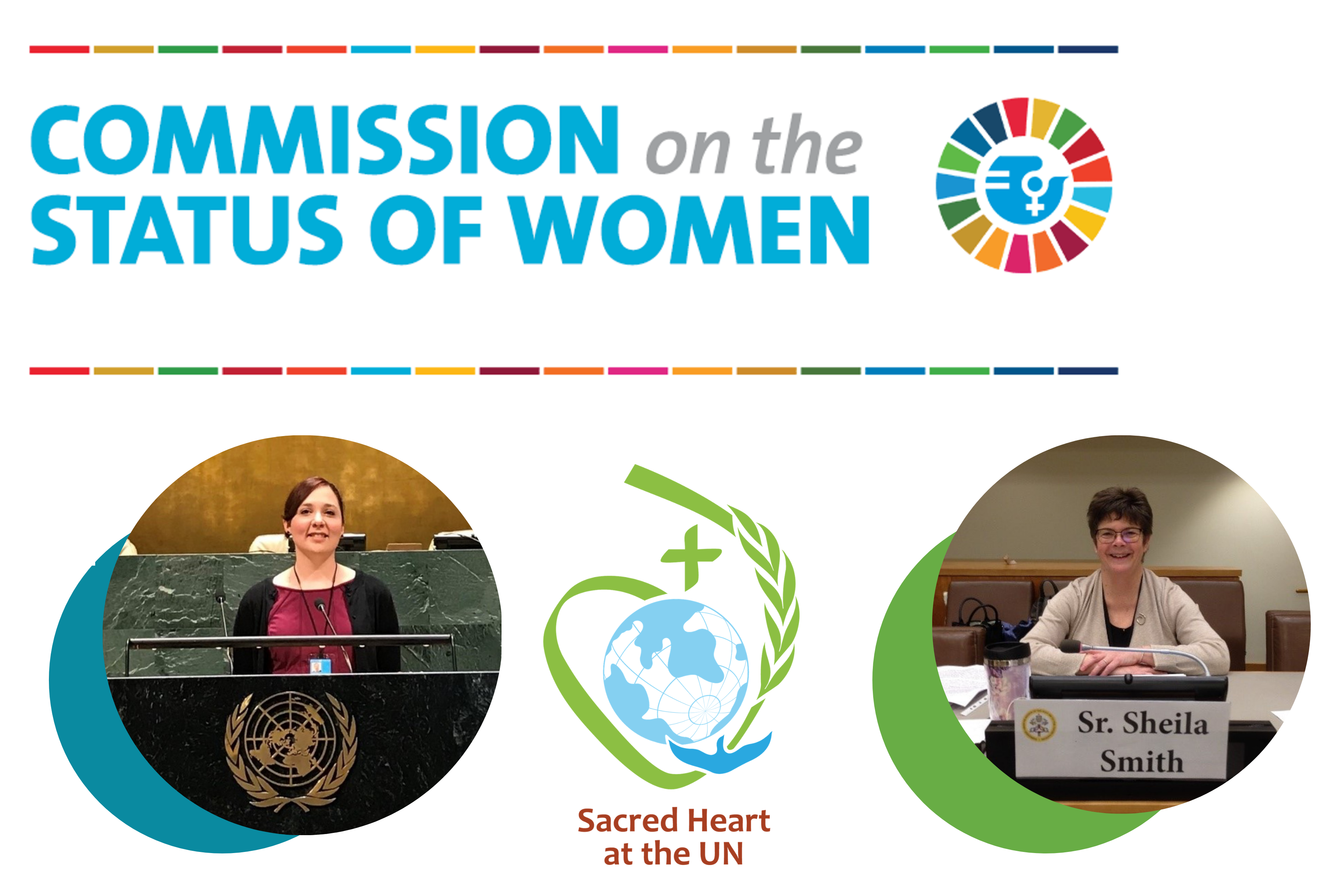 The 65th UN Commission on the Status of Women (CSW65) was held virtually from March 15-26, 2021. The priority theme was “Women's full and effective participation and decision-making in public life, as well as the elimination of violence, for achieving gender equality and the empowerment of all women and girls.”
The 65th UN Commission on the Status of Women (CSW65) was held virtually from March 15-26, 2021. The priority theme was “Women's full and effective participation and decision-making in public life, as well as the elimination of violence, for achieving gender equality and the empowerment of all women and girls.”
Delegates to CSW65 for the Society of the Sacred Heart were Lisabeth Kelly (UN-NGO volunteer, Sacred Heart alumna, and PhD Candidate) and Sheila Smith, RSCJ, UN-NGO Representative for the international Society of the Sacred Heart.
The Society of the Sacred Heart participated in CSW65 in three ways:
- Jointly submitted a written statement to UN States on the elimination of violence against women
- Virtually attended the CSW65 Civil Society Forum, which ran parallel to the official CSW government program
- Cosponsored a parallel event on domestic violence and degradation of our common home
Written Statement
A Written Statement was jointly submitted by Casa Generalizia della Societa’ del Sacro Cuore (our official United Nations Economic and Social Council name), Congregations of St. Joseph, Loretto Community (Sisters of Loretto) and Sisters of Notre Dame de Namur, all non-governmental organizations in consultative status with the Economic and Social Council.
In summation, the statement said that in order for women’s full and effective participation in political decision-making, they must feel safe in their relationships, homes and communities. In order for that to happen, violence against women and girls must stop. However, during the COVID-19 pandemic, women who are already at risk of violence are less protected. During the pandemic, often the funds allocated to address violence against women are being diverted and services to women have diminished. Increased climate disasters also create unsafe situations for women and girls who must choose isolated alternate routes to gather food and water for their families. Further, whole communities and cultures lack educational curriculum and systems that help transform attitudes, norms and policies that negatively affect women and girls. Finally, we assert that women and girls are capable of making decisions that concern them.
Some of our key recommendations to governments include:
- Collaborate with civil society, including faith-based groups such as ours, who are already addressing gender-based violence with curriculum and empowerment initiatives.
- Provide girls and women with equal and equitable access to quality education, vocational training and work opportunities, including in STEM fields (science, technology, engineering, math).
- Commit to ensuring girls’ completion of secondary school, which increases girls’ survival rates, potential income, and decreases the likelihood of child marriage.
- Provide education for families, boys, communities and social institutions regarding gender equality and equity
- Open spaces for the participation of women and girls in decision-making and negotiations at all levels of government and institutions
- Provide appropriate gender-based educational actions to dismantle patriarchal and cultural attitudes, norms, practices and policies that harm girls and women
- Recognize that women and girls have the capacity, to represent themselves, and to be part of decision-making and problem solving
CSW65 Civil Society Forum
Kelly focused on events pertaining to education, equity, public participation and girls empowerment. Sister Smith focused on events about participation and decision-making in public life and empowerment of migrant women and indigenous women. Outlined below are some important calls that echoed throughout the forum and can help us all build forward from the global pandemic:
- Ensure equal access globally for women and girls to access digital technology and training, especially in rural areas and among migrant populations
- Learn from the global pandemic and innovate new contextualized modalities for education that prioritize women and girls who were already disadvantaged before the pandemic, and who are now at risk of not returning to school at all
- Recognize the capacity of women and girls as agents of change and prioritize their participation in leadership and decision making
- Integrate gender-based approaches to education, i.e. education-health services -access to water and hygiene, and community-school-family
- Funds to address the global problem of missing and murdered indigenous women and girls need to be managed by indigenous governments and especially women themselves
- Encourage the expansion of infrastructure with an eye towards easing the limitations girls face in accessing education
- Recognize the multiplicity of needs and contexts which women and girls experience, and work to ensure that proposed solutions take these differing needs into account
Co-sponsored parallel event
On Monday, March 15, the Society co-sponsored the event “Domestic Violence: Gender-based Violence & Degradation of our common home.” The event included panel presentations in English and Spanish from Papua New Guinea, Peru, Argentina and Australia. A recording of the panel presentation can be viewed on the Facebook page of Mercy International Association.
Outcomes of CSW65
The call for education appears 44 times in the 64 Agreed Conclusions of the 65th Commission on the Status of Women (CSW65). Among these outcomes, we read the following in conclusion number 33:
The Commission recognizes that progress in achieving gender equality and the empowerment of all women and girls, and the full enjoyment of their human rights, has been held back owing to the persistence of historical and structural unequal power relations between women and men, poverty, inequalities and disadvantages in access to, ownership of and control over resources, growing gaps in equality of opportunity and limited access to social protection systems and public services, including universal health-care services and education, gender-based violence, discriminatory laws and policies, negative social norms and gender stereotypes and the unequal sharing of unpaid care and domestic work. It stresses the urgency of eliminating those structural barriers in order to realize gender equality and the empowerment of all women and girls, which translate into their full and effective participation and decision-making in public life.



